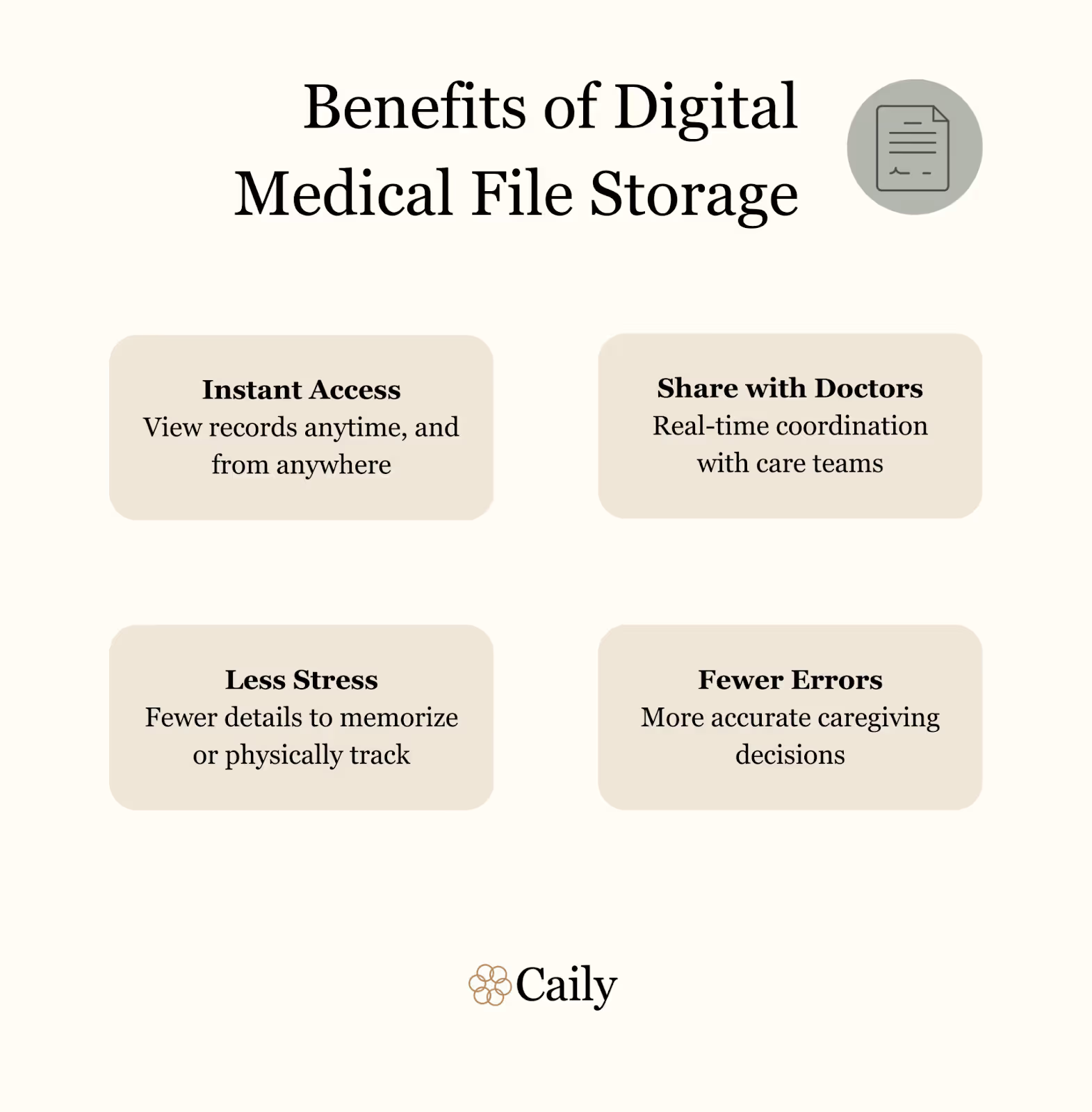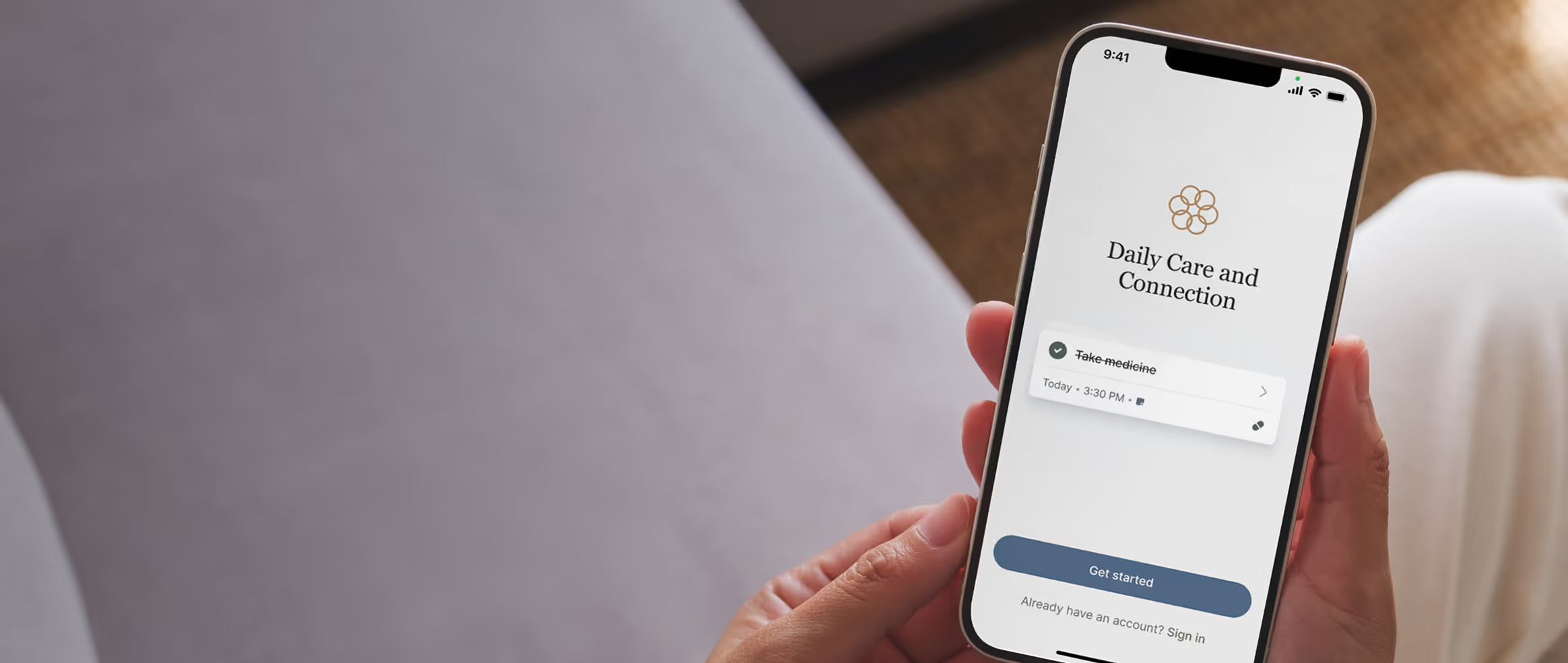How Digital Medical Document Storage Improves Caregiving

This site uses affiliate links that may result in commissions.
Caring for a loved one means juggling appointments, medications, doctor notes, and a mountain of paperwork. For family caregivers and professional caregivers alike, managing health records can feel like a full-time job. Add to this the emotional toll of caregiving, and it’s no wonder that many feel overwhelmed.
Fortunately, today’s technology offers smarter ways to stay organized and confident when storing medical information for caregivers. Digital medical document storage is transforming how caregivers track, share, and access health information. From simplifying emergencies to lightening mental loads, digital file storage is becoming an essential tool in every caregiver’s arsenal.
In this article, we’ll explore the pitfalls of traditional paperwork, the game-changing benefits of storing medical records online, and how caregiving apps with file storage, like Caily, can make your job significantly easier.
The Problem with Paper Medical Records
It's not uncommon to leave a doctors appointment with a stack of papers. Especially if you're managing a complicated illness or have several medications to keep track of, medical professionals can give their printer a workout.
Each of those printouts is important, and they likely reflect information you want to absorb today as well as be able to reference in the future, but where do you put them? Even if you have a great filing cabinet to put these documents into, you may be running out of room.
Easy to Misplace or Forget
Paper records are fragile. They’re easily lost in catch-all drawers, between car seats, or misplaced between appointments. When you’re juggling multiple prescriptions and specialists, a single missing document can mean the difference between the right care and unnecessary delays. When caregivers take on more medical responsibilities, the risks of lost paperwork only increase.
Additionally, keeping track of updated files—like medication changes, test results, or physician notes—is difficult with a paper-based system. Unless meticulously organized, information gets buried, forgotten, or duplicated. This can lead to confusion, missed appointments, or worse, mistakes in caregiving.
People don't keep nearly as much paperwork as they used to, and the reason is that so much of it has moved online. Digital file storage is cheap and ubiquitous, and having a powerful caregiving app on your side can make your piles of paperwork a thing of the past.
Hard to Access During Emergencies
Emergencies don’t wait for you to dig through file folders. Whether at the ER or a new specialist’s office, having immediate access to health history, allergy lists, and medication details is critical. With paper, time is wasted sorting through folders or digging through unimportant papers to find the essential ones. With digital tools, it’s right there in your pocket.
Imagine arriving at a hospital without a list of medications or past diagnoses. You could spend critical minutes explaining everything—or worse, omit something vital. In high-pressure moments, having real-time access to digital medical records helps caregivers advocate effectively and ensures medical staff make the best decisions.
Not Easily Shareable Between Care Teams
Modern caregiving involves a village—nurses, physicians, family members, and more. Paper documents make coordination clunky. Faxing records or scanning forms is outdated and inconvenient. Worse, important updates can be lost in the shuffle.
When care teams are disjointed, it can lead to redundant treatments, conflicting advice, and overwhelmed caregivers. The inability to easily share and sync medical data can compromise the overall quality of care and slow down vital progress. A unified digital approach fosters collaboration and better outcomes.

Benefits of Digital Medical Document Storage
When your banking, messages, and daily notes are stored online, it only makes sense to similarly have your medical documents available at the tip of your fingers. Most Americans don't have a printer in their home anymore, which leads their devices to become a printer of sorts, with all types of files instantly accessible on whatever screen they have with them.
24/7 Accessibility for Caregivers and Family
With digital health document management, essential information is always within reach—whether you’re at a doctor’s office, traveling, or just need a quick refresher. All you need is a smartphone or tablet to view lab results, past visits, or current care plans.
This accessibility is especially helpful for families with multiple caregivers or long-distance loved ones. Everyone involved in care can have the most up-to-date information, no matter where they are. It reduces friction and ensures everyone is aligned. Paired with a shared calendar and chat functions, this instant accessibility can drastically reduce confusion and empower caregiving efforts.
Simplified Coordination with Doctors and Specialists
Caregiver organization tools that include document storage empower you to share files instantly and accurately. This leads to better-informed medical decisions, streamlined appointments, and faster treatments.
Imagine showing a new health specialist a timeline of your loved one’s health conditions, lab work, and doctor notes—all in one place. Instead of recounting everything verbally, you can share accurate files that save time and improve care continuity. It’s a smart way to advocate effectively.
Improved Accuracy in Caregiving Decisions
Having access to digital records eliminates guesswork. From medication dosages to discharge instructions, caregivers can reference exact details to ensure proper care. Mistakes caused by miscommunication or forgotten instructions are drastically reduced.
Accurate, up-to-date information means fewer errors and more confidence in the care you provide. Whether you're following dietary restrictions, administering medications, or monitoring recovery progress, digital records act as a reliable guide both today and in the future.
Reduces the Mental Load on Caregivers
Digital tools declutter more than just physical space—they free up your brain space. Instead of remembering every detail or worrying about losing a form, caregivers can focus on providing compassionate, confident care. You don't need to remember where you put a paper or a folder, since everything is available on your phone, tablet, or computer.
Caregivers already carry a heavy emotional and logistical load. When you eliminate the fear of misplacing information, you create space for self-care and stronger emotional presence with your loved one. This peace of mind is invaluable.
How Caily Simplifies Medical Document Management
Caregiving is complicated, and especially in end-of-life scenarios it can be draining and stressful. We built Caily as the all-in-one platform to simplify caregiving, so that you don't have to worry about things like misplacing medical documents. Let us handle the organization and coordination, so that you can spend time making the important decisions.
Integration with EHR Records
Your health system uses Electronic Health Records (EHR), which is where your doctor keeps track of notes, appointments, and follow-ups. Caily integrates with those EHR systems to store all the latest info, right alongside your own notes, shared calendar, and chat.
This integration removes the guesswork, and makes it even simpler for you to reference the health professionals' notes so that you don't have to rely on transcribing their words during appointments. Instead, you can focus on asking the right questions with the knowledge that EHR notes will pull right into Caily.
Secure Uploads and Storage
Caily offers caregivers a secure platform to upload, categorize, and store every type of health document, from immunization records to advanced care directives. Everything is encrypted, private, and designed with caregiving in mind.
Security is a top concern when dealing with personal health information. Caily ensures your loved one’s data stays protected while being easily accessible to those who need it.
Shareable Access with Care Teams
With Caily, you control who sees what. Easily grant access to family members, doctors, or care managers, ensuring everyone stays in the loop. It’s a modern way to keep care collaborative and up-to-date.
Instead of mailing documents or making frantic texts or phone calls, Caily makes sharing as easy as sending a link. If you’re onboarding a new nurse or updating a sibling, sharing essential files is seamless and secure.
Peace of Mind in One Tap
Imagine going to the doctor and having every medical file—past and present—available with a single tap. That’s the peace of mind Caily provides. No scrambling. No stress. Just answers when you need them most.
You don’t need to be tech-savvy to use it either. Caily is designed to be intuitive and user-friendly for all levels of caregivers. The goal is to make organization effortless so you can focus on what matters: providing excellent care.
Mastering Medical Document Storage
Managing caregiving tasks is hard enough—don’t let paperwork make it harder. Storing medical records online offers caregivers clarity, control, and calm in even the most chaotic moments. With tools like Caily, organizing health information becomes one less thing to worry about.
As more families choose to care for loved ones at home or coordinate efforts from afar, having reliable, accessible, and secure medical document storage isn’t a luxury—it’s a necessity. Digital solutions like Caily ensure you’re always prepared, informed, and empowered.
Ditch the paperwork chaos—store and share your loved one’s medical records securely with Caily. Sign up today!
FAQs About Medical Document Storage
What is medical document storage?
Medical document storage refers to the organization and safekeeping of health-related records, such as prescriptions, test results, diagnoses, treatment plans, and insurance documents. Traditionally, these records were stored in paper format, but today digital medical document storage allows caregivers and patients to securely store and access these files online. Platforms like Caily help caregivers manage, share, and retrieve vital medical information quickly, making caregiving more efficient and less stressful.
Why should you store medical documents digitally?
Storing medical records online offers numerous benefits for caregivers. Digital storage ensures 24/7 access to health information, streamlines coordination with healthcare providers, and reduces the risk of lost or outdated paperwork. It also improves decision-making by allowing caregivers to reference the most up-to-date details anytime and from anywhere. With caregiver organization tools like Caily, you can manage everything from medication logs to doctor notes in one secure, easy-to-navigate platform.
Is digital document storage secure?
Yes, digital medical document storage is highly secure when using trusted platforms that comply with privacy regulations. Services such as Caily use bank-level encryption, password protection, and permission-based sharing to safeguard your sensitive health data. In many cases, digital storage is actually safer than paper files, which can be easily lost, stolen, or damaged. Choosing a secure, caregiver-focused app helps ensure your documents remain private, organized, and protected.
What kinds of medical documents should I store digitally?
You should digitally store any document that supports your caregiving responsibilities or may be needed during medical visits or emergencies. This includes:
- Medication lists and dosage instructions
- Doctor visit summaries and care plans
- Lab and test results
- Imaging reports (X-rays, MRIs, etc.)
- Vaccination records
- Allergy and diagnosis history
- Insurance cards and billing statements
- Advanced care directives and power of attorney forms
Using a health document management tool like Caily ensures these critical files are easy to find and share with your care team when needed.

Get Started Now
Enjoy full access to everything Caily offers, from medication tracking to shared schedules and daily check-ins. See how much easier caregiving can be when everything is coordinated in one place.
Start your free trial
